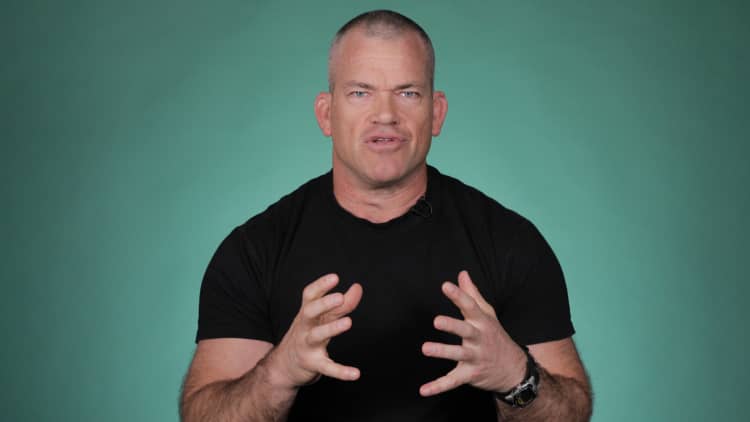Jack Dorsey, CEO of both Twitter and Square, took a 10-day meditation trip last month. It's a practice the tech leader said helps him de-stress and focus, one that hacks "the deepest layer of the mind."
Taking time for self-care, like Dorsey, is something more leaders should make time for, according to venture capitalist Fred Wilson.
Leaders carry immense burdens and often tackle problems that no one else can solve, said Wilson, the co-founder of Union Square Ventures and a early backer of companies like Twitter, as well as Etsy and Kickstarter.
That burden can have a negative impact on mental and physical health. "Leadership is lonely, stressful, and takes a toll on people," said Wilson. "Leaders are humans, too."
In light of the hardships leaders face, Wilson took to his blog last week to suggest simple ways leaders can prioritize self-care, tips he said he shares with the leaders he works with.
CNBC Make It has collected seven of those tips below, adding some of the latest research and insights from successful founders to help the busiest leaders better understand the importance of unplugging and recharging.

1. Take vacations
Wilson suggests leaders prioritize vacations. And while taking a vacation might be the last thing on your mind, research shows that taking breaks from work can give you a much-needed opportunity to de-stress, unwind and regroup, important for sparking new ideas and boosting productivity.
Taking vacations can also prolong your lifespan, according to a recent study, which found that people who shortchange their holidays have higher mortality rates, even if they've made healthy changes to their lifestyle.
Billionaire Virgin Group founder Richard Branson is a huge proponent of taking time off and offers unlimited vacations to all of his employees. "Freed from the daily stresses of my working life," said Branson, "I find that I am more likely to have insights into old problems."
2. Meditate
Twitter's Dorsey makes time for meditation, a practice Wilson supports. It's no wonder: meditation improves mental focus, boosts memory and can be an effective way to cope with the stress that leaders encounter.
Microsoft co-founder Bill Gates has seen the benefits of consistently practicing meditation. The billionaire recently said he meditates for ten minutes, two to three times a week, to help maintain his focus.
"I now see that meditation is simply exercise for the mind, similar to the way we exercise our muscles when we play sports," he writes on his blog, Gates Notes. "It's about taking a few minutes out of my day, learning how to pay attention to the thoughts in my head, and gaining a little bit of distance from them."
3. Eat healthy foods
This simple advice is easy for leaders to ignore, especially when they're pressed for time. However, your body actually performs at its best when given the highest quality foods. Studies have found a direct correlation between a diet high in refined sugar and impaired brain function, while others have linked nutrient-dense plant-based diets to a lower risk of depression and increased cognitive function.

4. Drink less alcohol
A glass of wine might seem like a great stress reliever, particularly for leaders who face intense pressure. But alcohol consumption, at any level, can have damaging health effects, according to recent research.
Studies also show that drinking can impair your decision-making, memory, attention span and ability to think abstractly.
If you can't see yourself cutting out cocktails completely, try not to exceed the "moderate alcohol consumption" limits set by health experts, and make time for other ways to unwind.
5. Exercise regularly
Wilson suggests leaders make time for exercise and the science agrees. Research shows that exercise enhances memory, slows brain aging and reduces stress and anxiety.
You don't need to spend hours at the gym to see the benefits, either. New research published in the Journal of Happiness Studies finds that doing any kind of physical activity for as little as 10 minutes out of your week can significantly boost the odds you'll feel happier.
If you're still not convinced, look to billionaires like Mark Zuckerberg and Richard Branson, who partly credit their success and happiness to physical fitness.
6. Work on your marriage
Wilson reminds leaders not to forget their significant others. To be sure, marital stress can be just as toxic as workplace stress, according to some recent studies. By investing in a supportive relationship, however, research shows you might be more likely to take on potentially rewarding challenges.
Berkshire Hathaway CEO, Warren Buffett, said as much in a 2017 Forbes interview. "Who you marry, which is the ultimate partnership, is enormously important in determining the happiness in your life and your success and I was lucky in that respect," said the billionaire.
7. Spend time with family
Family members can be your greatest advocates, particularly when times are tough. They often impart words of wisdom to keep you motivated and can act as a sounding board during challenging times. Many of today's top thought leaders attribute their success to their family, including Richard Branson.
"Without the love and support of my mother, father, sisters, aunts and uncles I wouldn't have had the self-belief to strive to achieve," he wrote in a Virgin blog post. "Without the love and support of my wife, children, children-in-law and grandchildren I wouldn't have the drive to keep achieving."
Like this story? Like CNBC Make It on Facebook.
Don't miss: Why this company pays its workers to get a full night's rest



